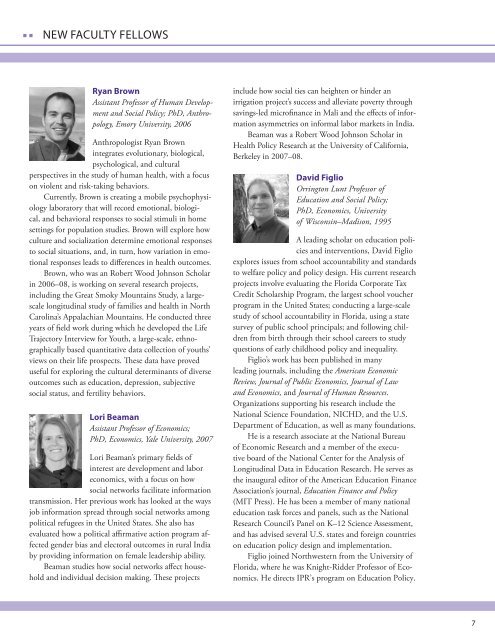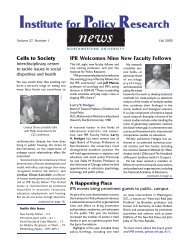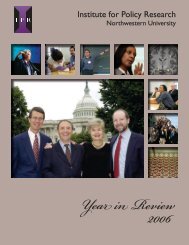IPR - Institute for Policy Research - Northwestern University
IPR - Institute for Policy Research - Northwestern University
IPR - Institute for Policy Research - Northwestern University
You also want an ePaper? Increase the reach of your titles
YUMPU automatically turns print PDFs into web optimized ePapers that Google loves.
New faculty Fellows<br />
Ryan Brown<br />
Assistant Professor of Human Development<br />
and Social <strong>Policy</strong>; PhD, Anthropology,<br />
Emory <strong>University</strong>, 2006<br />
Anthropologist Ryan Brown<br />
integrates evolutionary, biological,<br />
psychological, and cultural<br />
perspectives in the study of human health, with a focus<br />
on violent and risk-taking behaviors.<br />
Currently, Brown is creating a mobile psychophysiology<br />
laboratory that will record emotional, biological,<br />
and behavioral responses to social stimuli in home<br />
settings <strong>for</strong> population studies. Brown will explore how<br />
culture and socialization determine emotional responses<br />
to social situations, and, in turn, how variation in emotional<br />
responses leads to differences in health outcomes.<br />
Brown, who was an Robert Wood Johnson Scholar<br />
in 2006–08, is working on several research projects,<br />
including the Great Smoky Mountains Study, a largescale<br />
longitudinal study of families and health in North<br />
Carolina’s Appalachian Mountains. He conducted three<br />
years of field work during which he developed the Life<br />
Trajectory Interview <strong>for</strong> Youth, a large-scale, ethnographically<br />
based quantitative data collection of youths’<br />
views on their life prospects. These data have proved<br />
useful <strong>for</strong> exploring the cultural determinants of diverse<br />
outcomes such as education, depression, subjective<br />
social status, and fertility behaviors.<br />
Lori Beaman<br />
Assistant Professor of Economics;<br />
PhD, Economics, Yale <strong>University</strong>, 2007<br />
Lori Beaman’s primary fields of<br />
interest are development and labor<br />
economics, with a focus on how<br />
social networks facilitate in<strong>for</strong>mation<br />
transmission. Her previous work has looked at the ways<br />
job in<strong>for</strong>mation spread through social networks among<br />
political refugees in the United States. She also has<br />
evaluated how a political affirmative action program affected<br />
gender bias and electoral outcomes in rural India<br />
by providing in<strong>for</strong>mation on female leadership ability.<br />
Beaman studies how social networks affect household<br />
and individual decision making. These projects<br />
include how social ties can heighten or hinder an<br />
irrigation project’s success and alleviate poverty through<br />
savings-led microfinance in Mali and the effects of in<strong>for</strong>mation<br />
asymmetries on in<strong>for</strong>mal labor markets in India.<br />
Beaman was a Robert Wood Johnson Scholar in<br />
Health <strong>Policy</strong> <strong>Research</strong> at the <strong>University</strong> of Cali<strong>for</strong>nia,<br />
Berkeley in 2007–08.<br />
David Figlio<br />
Orrington Lunt Professor of<br />
Education and Social <strong>Policy</strong>;<br />
PhD, Economics, <strong>University</strong><br />
of Wisconsin–Madison, 1995<br />
A leading scholar on education policies<br />
and interventions, David Figlio<br />
explores issues from school accountability and standards<br />
to welfare policy and policy design. His current research<br />
projects involve evaluating the Florida Corporate Tax<br />
Credit Scholarship Program, the largest school voucher<br />
program in the United States; conducting a large-scale<br />
study of school accountability in Florida, using a state<br />
survey of public school principals; and following children<br />
from birth through their school careers to study<br />
questions of early childhood policy and inequality.<br />
Figlio’s work has been published in many<br />
leading journals, including the American Economic<br />
Review, Journal of Public Economics, Journal of Law<br />
and Economics, and Journal of Human Resources.<br />
Organizations supporting his research include the<br />
National Science Foundation, NICHD, and the U.S.<br />
Department of Education, as well as many foundations.<br />
He is a research associate at the National Bureau<br />
of Economic <strong>Research</strong> and a member of the executive<br />
board of the National Center <strong>for</strong> the Analysis of<br />
Longitudinal Data in Education <strong>Research</strong>. He serves as<br />
the inaugural editor of the American Education Finance<br />
Association’s journal, Education Finance and <strong>Policy</strong><br />
(MIT Press). He has been a member of many national<br />
education task <strong>for</strong>ces and panels, such as the National<br />
<strong>Research</strong> Council’s Panel on K–12 Science Assessment,<br />
and has advised several U.S. states and <strong>for</strong>eign countries<br />
on education policy design and implementation.<br />
Figlio joined <strong>Northwestern</strong> from the <strong>University</strong> of<br />
Florida, where he was Knight-Ridder Professor of Economics.<br />
He directs <strong>IPR</strong>’s program on Education <strong>Policy</strong>.<br />
7
















